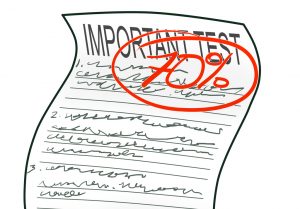EHS retake policy aims to instill perfection rather than fostering growth
March 26, 2019
We have all been in that situation when the highly anticipated yellow dot pops up on Schoology, and as we hesitantly click on it and watch the gradebook come up, our stomachs drop at the sight we see. As much as we tried to avoid these moments of despair, getting bad grades once in a while is inevitable: they’re bound to happen.
This is due to the fact that mistakes are perhaps the most important part of the learning process, and how we respond to and rebound from these errors is the most important sign of growth. Second-chances and mistakes are the norms of the real world; no one is expected to be perfect. One mistake or misfortune shouldn’t be able to determine the course of our success in an area. The 70-75% cap on the retake policy at Edina High School is obstructive and misleading when it comes to enhancing and representing our growth and learning.
After one slip-up, despite the plans we make to meet with a teacher during flex and review and study over the week, the mellow barrier of the retake cap still looms over our head as we try to reassess our knowledge and advance in the coursework. Even more disappointing is the fact that this barrier may hinder our motivation to fully learn the material. For example, wouldn’t we be more driven to study for a test knowing that we are aiming for the full 100%, rather than a mere 75%? This barrier that is set before we even begin to start the process of re-learning isn’t effective when it comes to our mindset and striving for our full capacity.
Next, EHS is infamous for its “personalized learning” program. Briefly, it tries to provide each student with the best method of learning that works for them. In class, most summative assessments consist of tests and exams, or sometimes projects and labs. Every student has a method that works best for them, some focus well in the test-taking environment while others thrive during flexible projects. Being sufficient at each type is definitely a needed skill to have, but during high school, students still tend to lean towards a preferred side, and this isn’t and shouldn’t be considered a bad thing. If we aren’t the strongest test taker, we should be allowed the room to grow as one, without the pressure of a single-shot at the test weighing students down during an already difficult time. For those that don’t have special testing accommodations, this can take a toll on their health and ability to test effectively. The pressure is tough enough without the cut-off needing to weigh them down.
In the book The Gift of Failure: How the Best Parents Learn to Let Go So Their Children Can Succeed, authored by Jessica Lahey, Lahey says “What we should be talking about is that ‘summative’ or ‘cumulative’ assessments, when teachers teach a unit, then there’s a big comprehensive unit test at the end, is not effective teaching or assessment, and it does not promote true, deep learning. When summative or cumulative assessments are paired with a ‘no retake’ option, we are really failing kids and their learning.”
Summative tests and assessments aren’t accurate representations of our learning and do not engage students in it effectively. More so, when we’re relying on these same tests to take up 90% of our grade and demonstrate our knowledge, the system is failing students. It no longer depends on the quality of education or grasp on concepts, it depends on how good of a test-taker we are or if we got lucky and reviewed the exact concepts and questions that would show up on the test. The already weak system is becoming more weakened by this mindset of perfection fostered by the administration.
Learning is a process. Sometimes it takes countless attempts to get something right, but this is completely okay. Test scores should be an accurate reflection of our knowledge, if we truly have grown in our learning, then that percentage marked on our test should show this. The administration shouldn’t be allowed to depict themselves as one that fosters growth when in reality, the retake policy weighs so heavily on the opposite.
Some might argue that students would take advantage of the retake policy by not preparing for a test the first time so that they can retake it. However, many teachers have time limits on when you can complete a retake by; if students really do not know the material well and are slacking off on the first test, they won’t be able to instantly relearn the material so that they will be able to do better on the second. Not everyone is going to take advantage of the retake policy because doing well requires hard work. The retake policy is truly beneficial to those students who work hard and learn from their mistakes. Perhaps, if the policy was changed, then more students would be motivated to act this way.
EHS provides the opportunity of having a retake, which we should be grateful for, but the school should provide students with one that would be more beneficial to students. After all, it’s the learning that matters.


